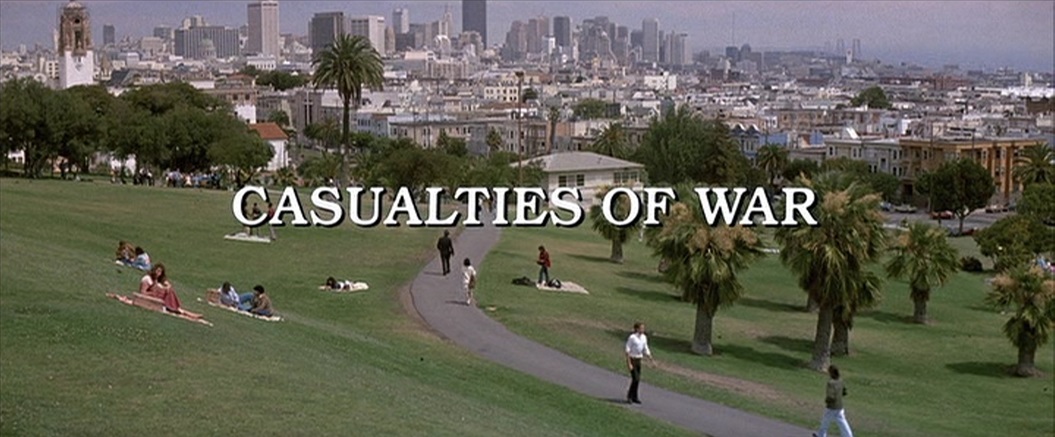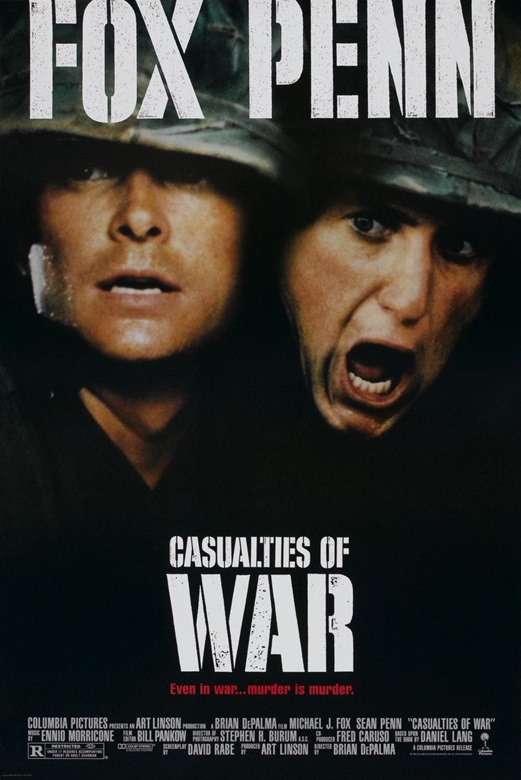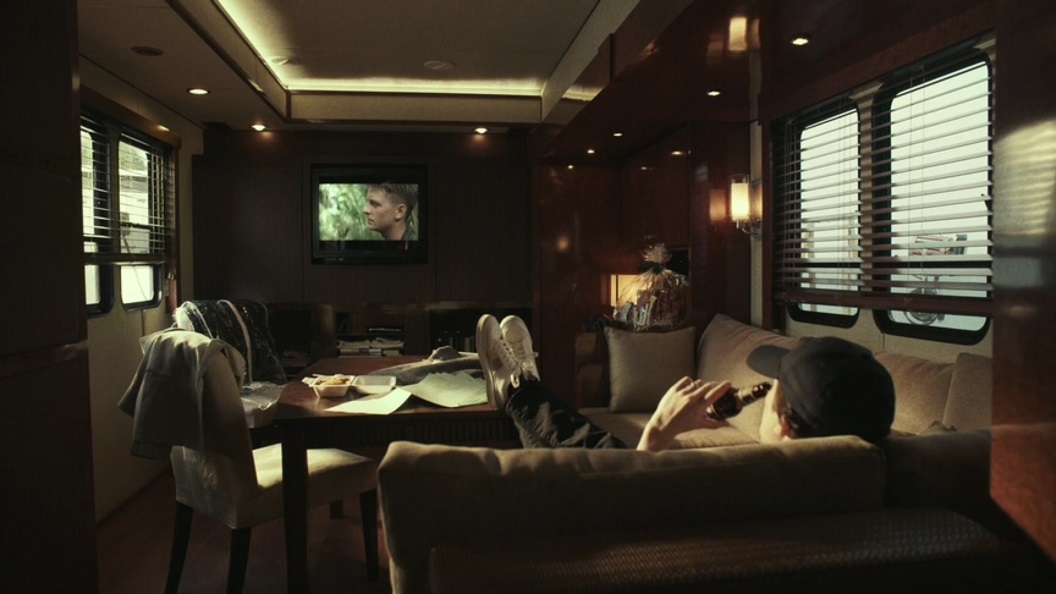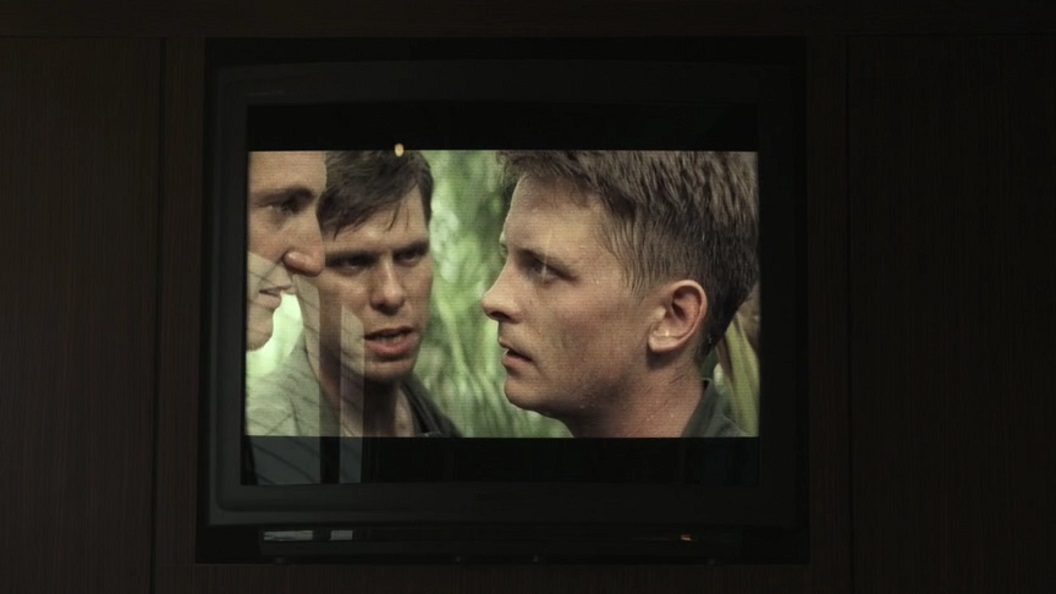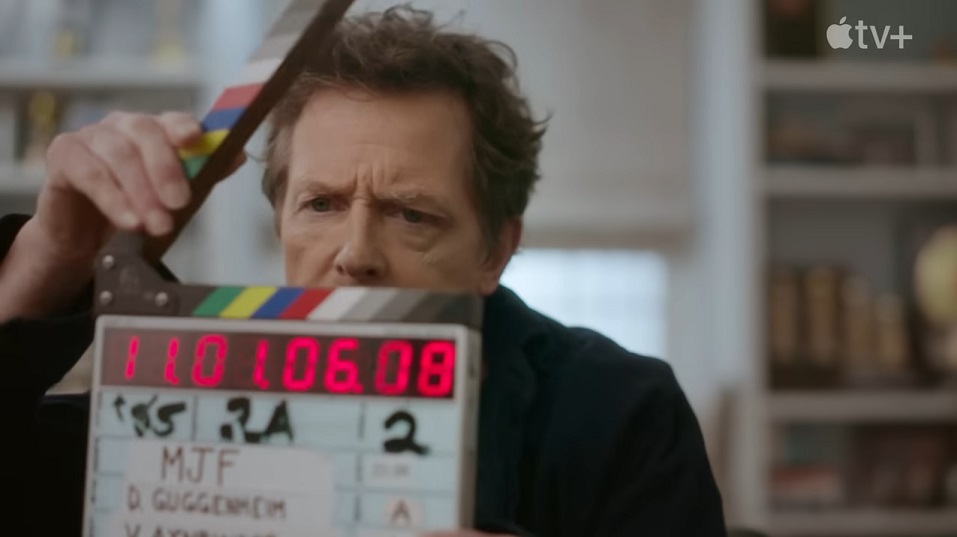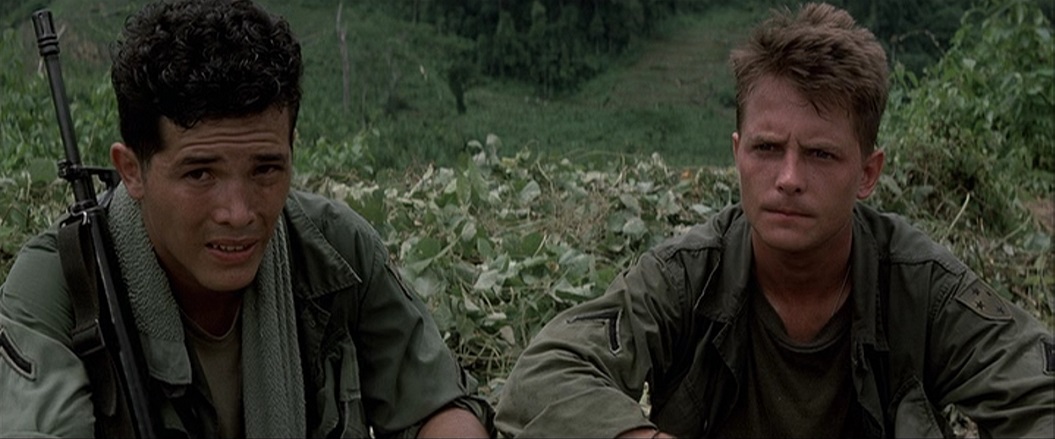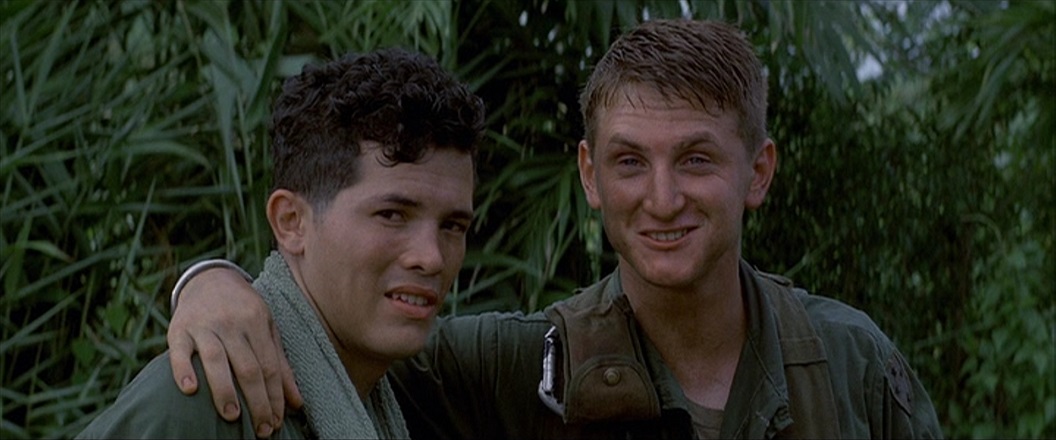DE PALMA TO BRUCE WEBER IN 1989: "IN A MOVIE LIKE THIS, I'M NOT SURE TESTING HAS ANY RELEVANCE"
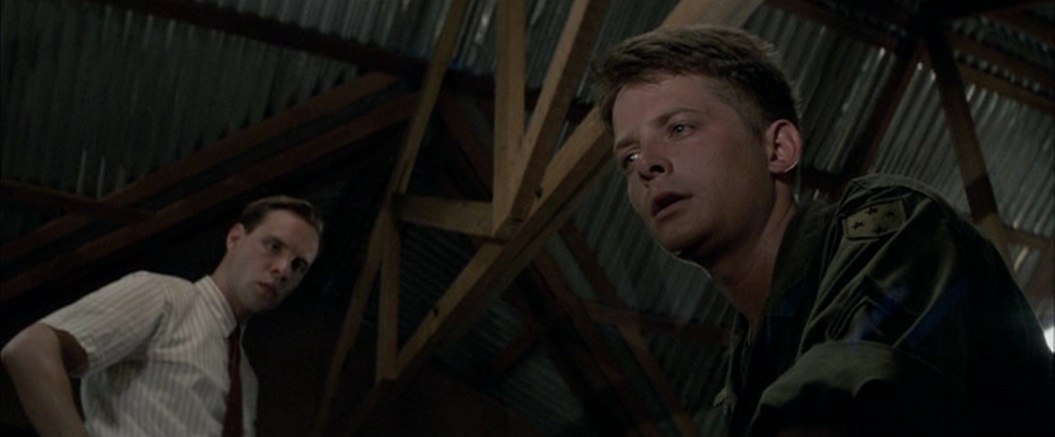
In 2006, when Columbia released Brian De Palma's restored cut of Casualties Of War, it was billed as the "Extended Cut."
In May of 1989, three months prior to the theatrical release of Casualties Of War, the New York Times Magazine published an article about the film by Bruce Weber, which begins with a test screening of the film. Here's an excerpt, courtesy of the book Brian De Palma Interviews, edited by Laurence F. Knapp:
IN THE MINUTES BEFORE the first public test screening of Brian De Palma's new movie at a theater in Boston, a young man approaches Steven Spielberg, De Palma's friend and fellow director who is sitting in the audience with a baseball cap pulled down over his brow, and asks him if he is Steven Spielberg."No," Steven Spielberg says, though as the man begins to walk away, he changes his mind.
Ambivalence and nervousness are prevalent this evening. De Palma himself, who believes this movie, Casualties of War, unequivocally to be his best, is nonetheless aware that it is not a romping entertainment. "It's so intense people may get up and leave," he said earlier in the day. At the moment, he's in the front row, and will spend the evening with his back to the screen, watching the audience.
Farther back, seated with Spielberg, are the film's producer, Art Linson, and several Columbia Pictures executives, including Dawn Steel, who approved the project in November 1987, shortly after she became president of the beleaguered studio.
Casualties of War had been abandoned by Paramount, Steel's previous employer; she rescued it for Columbia, upped the budget to a reported $22.5 million and made it her first "green light." Columbia finished 1988 last among the nine major movie studios in domestic market share, and Steel, charged with effecting a resurgence, is now awaiting summer, when the first movies produced at the studio on her watch will be released. Though Casualties of War features Michael J. Fox and Sean Penn, and is thus compatible with Steel's predilection for star packages, it isn't Ghostbusters II (which is due next month). As the lights go down, Steel is visibly on edge.
Based on the true story of an atrocity committed by a squad of American soldiers in Vietnam, Casualties of War is immediately recognizable as a Brian De Palma film. In its opening sequence, a nighttime battle in the jungle that is photographed in the glossy, hyperbolized mode De Palma has frequently favored in his depictions of threat and chaos, Daniel Eriksson, a "cherry" who is seeing his first action, falls through a hole in the jungle floor and finds himself wedged in the earth up to his armpits, his legs dangling into a tunnel dug by the Vietcong. Played by Fox, Eriksson is plainly terrified, but he is spared a bit of suspense that the audience, which sees that the tunnel occupied, is not. As Eriksson is yanked to safety by a comrade, an enemy guerrilla swipes at his legs with a knife-and misses.
It is a typical De Palma manipulation, a macabre joke played both for the audience and at its expense. It is the only one in the picture: Though the film is bursting with De Palma's inventions, the grim truth of the material is no laughing matter. When the squad members, sent on a scouting patrol, kidnap a young Vietnamese woman, rape her and kill her, Eriksson is unable to stop them and bears excruciating witness to the crime. For the remainder of the movie, he is at the mercy of his conscience.
In the middle of the screening, half a dozen people do pick up and leave. And when the lights finally come up the theater is silent. Not a rustle. Eventually, as opinion cards are distributed, Steven Spielberg leans across Dawn Steel, whose fists are not yet unclenched, and murmurs a judgment to a man sitting on her opposite side.
"You'll be thinking about this for a week," he says.
"Maybe the ending could be made simpler," De Palma says. It is the following morning, and he doesn't look well. A large man - his girth, like many of his movies, is reminiscent of Alfred Hitchcock - he is devilishly bearded, and can be imposingly stone-faced. But today he is pale with apparent sleeplessness. After the screening, he attended a focus group discussion, examined the audience opinion cards and went to bed. Dawn Steel and Art Linson have expressed a wary satisfaction at the results of the test, but sipping cappuccino in the lounge of his hotel and speaking in his oddly reedy voice, De Palma is more forthright. The focus group had been impatient during a key expository sequence, he says, and he now wears the aspect of a man who, at the end of a long and grueling effort, has just discovered there is more work to be done.
"We were disappointed," he says, acknowledging that the majority of the audience graded the picture in the good to very good range. "What you really want," he says, and then stops to distance himself from the studio executives. "What they want is to have it tipped way high in the excellent area." He points out that, unlike a comedy, in which you can actually gauge what the audience thinks is funny, Casualties of War is supposed to leave the audience stunned, disturbed, introspective - and silent.
"In a movie like this, I'm not sure testing has any relevance," he says. "Still, you have to consider the problems when you read the cards and listen to the focus groups. You have to consider what's bothering them. Why aren't they reacting more strongly? It unnerves you. Everyone is unnerved. No question about it."
And then the Weber article ends on a note about that test screening:
"We were in hell for five months," said Michael J. Fox. Speaking during the filming of the movie's final sequence in a San Francisco park last summer, Fox had, along with the rest of the crew, just returned from the jungles of Thailand, where the bulk of the movie was shot, and where temperatures had been routinely over 100 degrees."You're physically exhausted, and because of the material, you're emotionally in a bit of a state," Fox said. "It was really important to watch Brian getting out of his Volvo every day, and to know that he knew exactly what was going to happen. He inspires confidence."
Indeed, as technicians, setting up one last shot, built a track on the park grass for a camera to dolly on, De Palma, supervising, was an enormous, composed presence amid the commotion. De Palma would explain later that the scene had been storyboarded long ago; it was already in his head, and because there were no grave problems afforded by the location, the only problem left, really, was the technical one - matching his vision.
In the sequence being filmed, Eriksson, years after his discharge, confronts a young woman who reminds him of the woman he saw killed. And in the final shot, the young woman emerges from a bus, followed by Eriksson, who pursues her into the park and calls after her. As the cameras rolled, De Palma, seated in a director's chair and watching the scene through a viewfinder, hunched his shoulders, becoming aggressively more attentive, like a cat who'd heard a distant, unidentifiable sound. Fox approached the camera; the camera dollied toward Fox, so that, in the end, they were inches apart, his face in close-up, the actress Thuy Thu Le offscreen. The whole thing lasted less than a minute.
De Palma ran the actors through eight takes, consulting with Fox after each, and finally, the last couple of times, hustling just to the edge of the confrontation himself, so that he, Fox, Thuy Thu Le and the cameraman were all huddled together under the sound boom as if it were an umbrella.
It was the acting that hadn't satisfied him - Michael Fox's final expression.
It's a difficult scene to bring off," he said afterward. "You know, you run into a stranger and she looks at you and understands something about you that no one's ever understood. In a sense, she's the forgiving angel. And he's got to show that he's been forgiven. In the initial takes, it just wasn't there."
Eight months later, sitting in his Boston hotel, De Palma is asked if this is the scene that befuddled the screening audience. "No," he says, "they seemed to like that. They thought the movie was paced very well. And they were not disturbed by the violence, which in a movie of mine is remarkable."
The problem, he explains, was in the court martial scene, which the audience seemed to feel reiterated dilemmas that had already been resolved. "I think it's important to see the squad members on the stand," he says, see what they have to say, see them confronted with what they've done. But you are taking the risk of dragging the audience back through material they are familiar with, in order to get the true emotional thrust of the movie - which is that these are all casualties of war." He admits that he's thinking of dropping the trial scene, or at least editing it down.
It's an interesting moment, the film maker listening in his head to several different voices at once. He looks as if he wished they would all shut up.
How, he is asked, will the decision be made? "Everyone will give me an opinion," he says. "and then I'll do what I want."




















